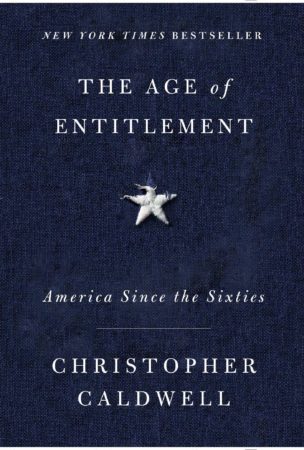First, apologies for the late book of the month announcement. Things have been hopping around here.

This month, I have selected Age of Entitlement by Christopher Caldwell. The subtitle is America Since the Sixties, and if you are among those who have been wondering what on earth actually happened to us, this book will answer many (if not all) of your questions. This is a fantastic read. I would give it five stars on a three star scale.
I do have quibbles here and there, but I suspect they are the sorts of objections that would be resolved in a ten minute conversation with the author. For example, I am an enthusiastic supply-sider, and I suspect Caldwell is not. But then, I agree with him about what actually happened in a divided government where one faction wants to grant tax relief to the hard working inventor, investor, or entrepreneur, and the other faction wants to give several barrels of washtub gin to a roving band of miscreants so that they might be motivated to raid that big warehouse down by the river. So to speak. The warehouse, we have reliably heard, is owned by someone with an unsavory relationship to the one percent.
The central thesis is controversial, but really ought not to be. Caldwell argues (and shows) that passage of the 1964 Civil Rights Act established a rival constitution in America, one that has been running alongside the original Constitution. In the old order, different factions tended to compete for their different ideals within a shared framework — the unhappy time of the Civil War excepted.
The issue of constitutional divergence is most clearly seen in the rival understandings of rights. Under the old order, a citizen’s rights were violated when he was denied a trial, or his newspaper was shut down, or his goods searched without a warrant. Under the new order, increasingly since 1964, a person’s rights are deemed to have been violated if there is any disparity in outcomes affecting his life that can be alleged to have been the result of discrimination. I almost put plausibly alleged, but even that is not necessary any more. Who needs to prove anything if their rights have been violated?
As you watch the world around you continue to spiral down into madness, this book will identify the culprit for you. A number of the people making these mad decisions are actually rational actors, responding to the actual threats they face in the law. And they face these threats because of the downstream effects of the 1964 Civil Rights Act. All of it — immigration issues, trannys in the bathroom at Target, queer theory majors at land grant universities, and so on. All of it. You know what happens to people who violate other people’s civil rights, don’t you?
The initial arguments for civil rights were plausible to reasonable people because the injustice advocated by actual bigots was so obviously demented and wrong. And so America signed up for “good” civil rights, where people would be judged by the content of their character, and not by the color of their skin. But when the ink was dry, and the fine print read by activist attorneys, and the lawsuits filed, and the lives and careers of public figures who transgressed the new canons of political correctness, we found ourselves here, with two rival and inconsistent constitutions. And this is why we have such a divided America, and this is why one of those constitutions has got to go.
Nobody needs an actual racist, but there will be no getting out of the mess we are in unless and until we find Christian leaders who are willing to be accused of being racist. And the evangelical and Reformed movement needs to get rid of the volunteer HR department that has cropped up in our midst.
One last comment. I confess that I am a little discomfited by the praise this book has been receiving from some quarters that were too fastidious to associate with people who have been arguing in a similar way for some years, or even for some decades. But that is hardly Caldwell’s fault. It’s just that my feelings are a little hurt, that’s all.
But I can reassure myself this way. We are fighting for the old Constitution, and the old Constitution didn’t care at all about my feelings.

